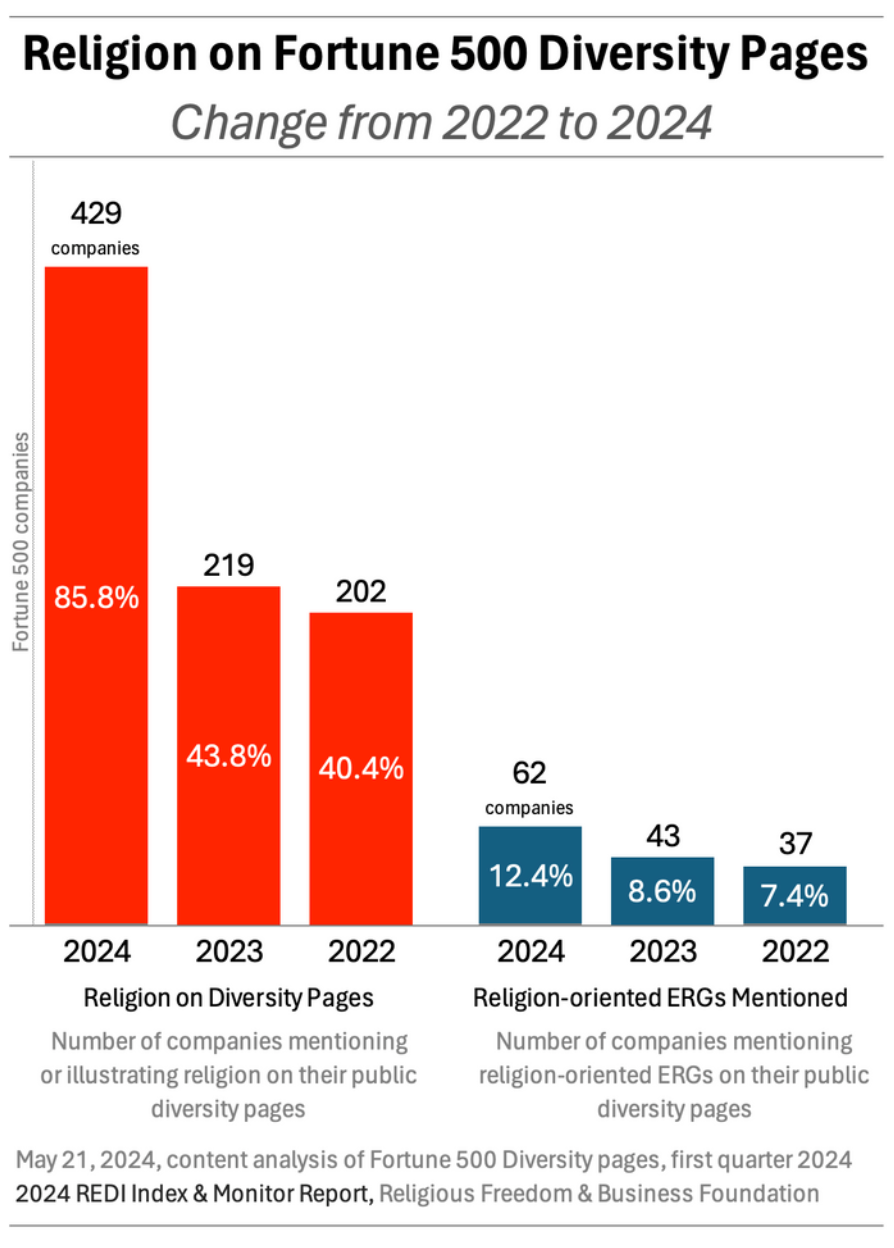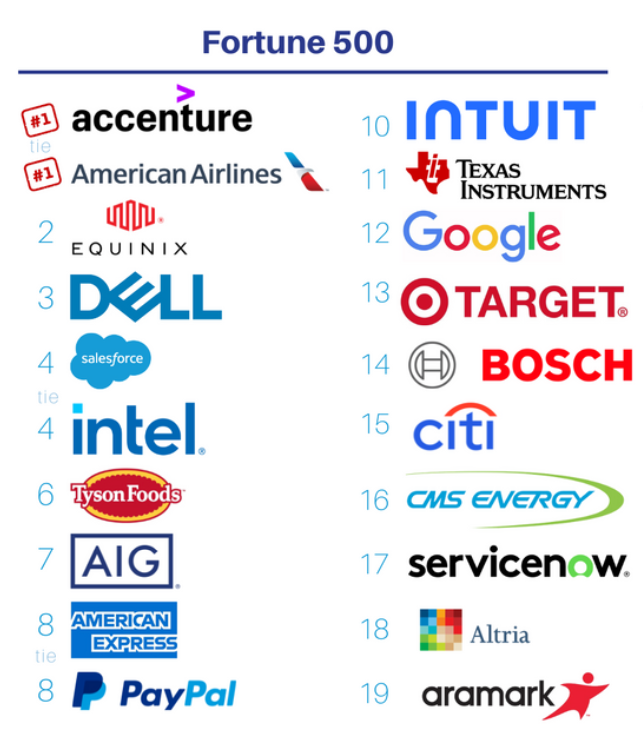
by Logan Tantibanchachai • 6 min read
Are things getting better for religious workers in America? According to a new index, America’s biggest companies are being more inclusive of religion in the workplace.
But while corporate America is making progress, religious discrimination in the workplace is still a serious problem, as we’ll discuss below.
The Religious Freedom and Business Foundation recently released their 2024 Corporate Religious Equity, Diversity, and Inclusion (REDI) Index. Every year, this index ranks the largest American companies based on their commitment to religious inclusion.
The REDI Index determines how faith-friendly a company by whether the company:
Over the last couple of years, the number of companies on the Fortune 500 list mentioning or illustrating religion on their public diversity pages has more than doubled. In 2022, about 40% of companies featured religion on diversity pages. In 2024, that number dramatically increased to about 86%. Based on these recent findings, it seems that some of America’s most influential companies realize that fostering religious diversity is good for business.

According to REDI, many of these companies aren’t just mentioning religious diversity, but appear to be taking some kind of action to better accommodate religious workers. For example, 69% of companies annually communicate procedures to their employees about how to request religious accommodations. This is good news. After all, when religious employees are accommodated and allowed to thrive, everyone wins.
So, which companies rank at the top for being the most faith-friendly? Here they are:

Corporate America is making progress. We think this has a lot to do with First Liberty’s landmark 9-0 victory at the U.S. Supreme Court last year in Groff v. DeJoy. That ruling clarified the legal standard for religious accommodation at work. It held that employers are required to accommodate religious employees under federal law unless doing so would substantially increase costs for the business – which is a big change from how courts used to interpret the law.
Even still, the fight for religious freedom in the workplace is not over.
You may have noticed that American Airlines ranked at the top of the list. It’s certainly good news for American Airlines workers if their employer is treating them well when it comes to religious accommodations.
But the same cannot be said of other airlines. Just look at the case First Liberty is fighting in federal court against Alaska Airlines.
In 2021, Alaska Airlines fired two flight attendants for expressing their Christian beliefs. Our clients, Lacey Smith and Marli Brown, posted their concerns about the Equality Act’s impact on women and people of faith on an internal company website. The company claimed that it invited questions and welcomed diverse views, but then it fired Marli and Lacey for their comments.
Maybe Alaska Airlines could learn a thing or two from their competitors about not discriminating against religious employees and treating them equally. It might not come as a surprise that Alaska Airlines ranked nowhere near the top of the list in the REDI Index.
Of course, what happened to these religious flight attendants isn’t a one-off. First Liberty is fighting multiple cases involving Americans who were fired for their religious convictions.
CVS fired Gunna Kristofersdottir, a nurse practitioner who worked at the CVS MinuteClinic in Tequesta, Florida. For about eight years, the company granted her a religious accommodation from prescribing contraceptive drugs that violate her religious beliefs as a Catholic On the rare occasion a patient asked for such a prescription, she referred them to another CVS MinuteClinic provider.
But CVS abruptly announced that it was revoking all religious accommodations that allowed providers for these drugs. In March 2022, the company fired Gunna.
And don’t forget our ongoing fight for Valerie Kloosterman. Michigan Health fired her because of her religious beliefs about gender ideology. Valerie was terminated for declining to use biology-obscuring pronouns or refer patients for “gender reassignment” drugs and procedures.
There’s no denying it. Religious discrimination in the workplace is a serious problem. According to the U.S. Equal Employment Opportunity Commission, in 2023 there were 4,341 filed complaints of workplace religious discrimination compared to 2,111 just two years ago.
The recent surge of these employment related religious discrimination cases indicates that millions of religious Americans in the workplace are at risk of being treated like second-class citizens. The reality is that a positive trend in corporate policies means little so long as anti-religious corporate environments, like Alaska Airlines, continue to exist.
Woke corporate America has seen how much it has gotten away with unlawful religious discrimination in the past. And maybe that’s why some companies think they can keep getting away with it.
Religious discrimination at work must stop. And YOU can be part of the solution by giving to First Liberty.
Your gift to First Liberty today goes to help everyday Americans like Lacey, Marli, Gunna, and Valerie. Every dollar you give goes a long way in helping us win for our clients who’ve been wrongfully punished or fired because of their faith.
We need to win these cases. Our clients are counting on all of us. Plus, a win for them is a win for all Americans. The result could impact countless everyday American workers—like YOU, your children and your grandchildren.